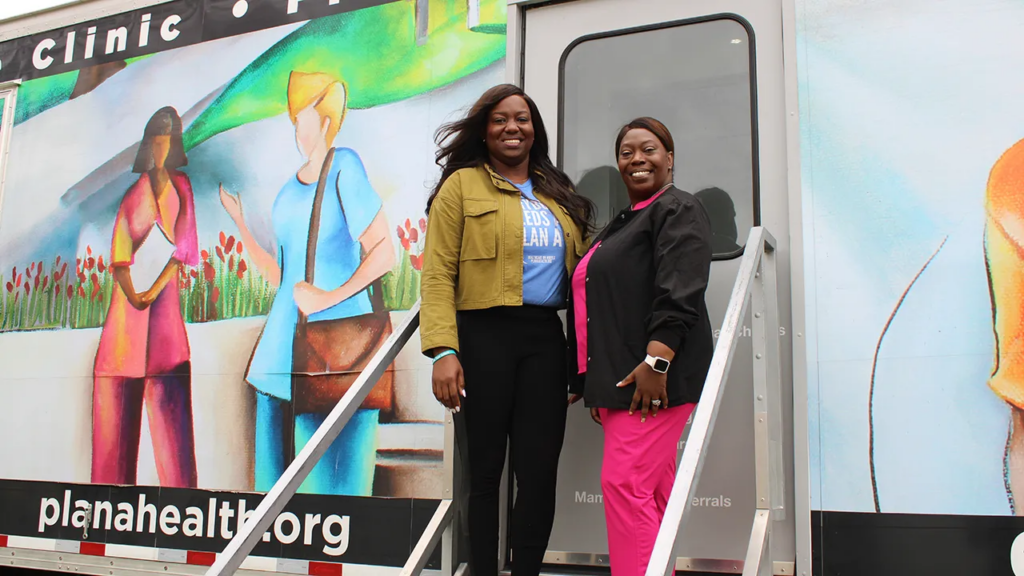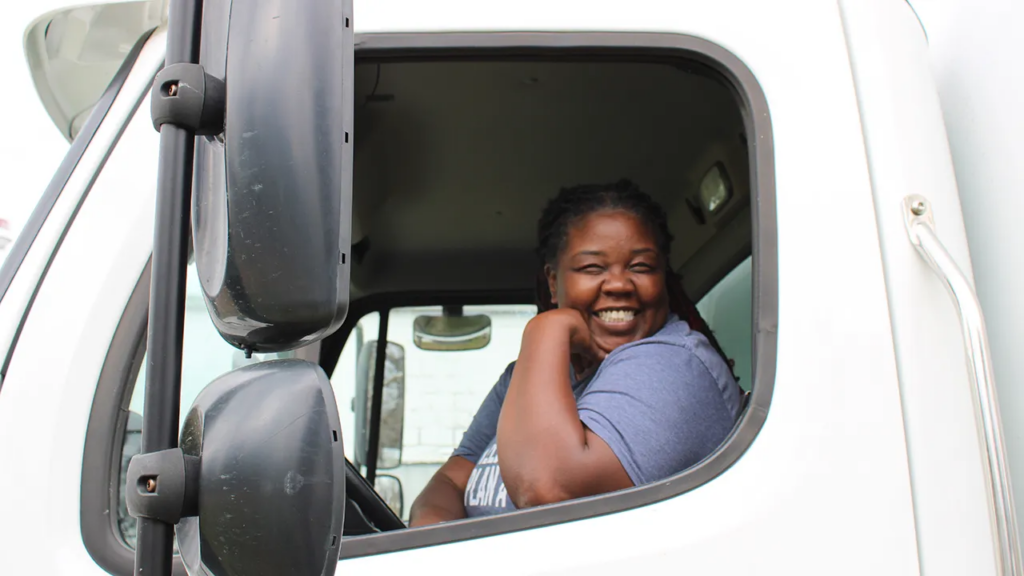A local team travels across the Mississippi Delta to ensure every adult has access to quality reproductive care, contraceptives, and trusting relationships with their medical team.

By Olivia Lewis
First published by Direct Relief on March 14, 2024.
MISSISSIPPI — “You get this service, you get this service, you get this service!” the Plan A Team chanted in unison, mimicking Oprah Winfrey’s iconic “You get a gift!” from her Favorite Things episodes.
In reality, everyone receives a gift at Plan A Health: quality medical care at no charge to the patient.
Plan A provides reproductive and primary care health throughout the Mississippi Delta, a region that historically has had poor health outcomes and low economic status. Their small team operates a mobile medical unit, outfitted with two exam rooms, that truck driver Antoinette Roby drives from city to city. Since its inception in 2018, Plan A has expanded to include a pharmacy, mail-order prescriptions, options for contraceptives, pre-and-post-natal care for patients with HIV, and telehealth for family planning. They’ve also hired a nurse practitioner that patients can call or text directly to ask questions.
While many initiatives were created to combat health disparities in Mississippi and have worked to increase access to care, the state still needs to catch up in adequate health measures. Mississippi’s government is one of the last states to consider expanding Medicaid. The State’s Health Department reported an increase in infant mortality in 2021, making Mississippi the state with the highest number of infant deaths in the country.
Plan A’s brick-and-mortar site is in a small town within the Delta, within an unassuming building off the main road that was a previous physician’s office. Their next goal includes an expansion into rural Georgia, where health disparities mimic the Mississippi Delta.
“It’s really been a delight to see how it’s grown, it’s pretty cool,” said Dr. Caroline Weinberg, CEO of Plan A.
Weinberg is the only non-Mississippi native on the team. The New Yorker founded Plan A and has hired people from the communities that Plan A serves. In turn, they’ve built trusting relationships across the Delta and more than doubled their patient base in the first three years of operation.
“If you put the trust in the community, (and understand) that they know what they need, and that services delivered by the community for the community are so important,” she said. “And then empower the people in the community to deliver those services.”
The people she’s hired are also well-known community members, like Desiree Norwood, who is the mayor of her hometown of Sunflower, Mississippi. Norwood said when the mobile medical unit arrives in Sunflower, people are excited because Plan A has built a reputable reputation.
“A lot of organizations come into the community, and they do evaluations and research and then what happens? They leave,” she said. “We’ve actually been able to fill a lot of gaps and alleviate some of those barriers that they’re facing.”
Norwood said a lot of trust-building has happened because the team lives in the areas that they are serving. They endure the same barriers to success and have remained in the Delta to improve the conditions. Norwood is known for taking her personal vehicle during off hours to visit patients who have asked for emergency contraceptives or general health inquiries. The small-town mayor said there is no such thing as a “9 to 5” for her.
“This isn’t working a job, it’s a passion,” Norwood said.
Every Plan A employee shared the same sentiments. Roby recounted a time when she followed up with a patient whose blood pressure was too high and asked him to seriously consider their suggestions on lifestyle changes. Months later, the patient’s wife approached Roby and thanked her for the conversation; her husband had listened, made changes, and was in better health.

Roby said that many uninsured people have neglected to attend doctor appointments and that some don’t know what to say or ask for when they meet with medical staff.
“You have to break it down and give them a better understanding,” she said. “Provide a higher level of patient care.”
Roby grew up in the Delta and said that the openness to learning about health conditions is growing. The driver of the mobile clinic said that parents are willing to learn about options for contraceptives for young adults and options for pre-natal and post-natal care with trusted physicians.
Roby said working at Plan A means a lot to her personally. She’s seen the effects of health disparities on her neighbors and wants to see better outcomes. She said that too often the people of the Delta have been overlooked for access to quality care.
“We never want anyone to have to choose between taking care of their family and getting the health care that they deserve,” Roby said.
While Plan A is a complement to other affordable health options in the area, some things set them apart. Plan A staff say they want to ensure that patients have options for their care. The health center offers variations of contraceptives and birth control for those who want to use the assistance. According to Weinberg, many women stop using birth control because of the side effects and the costly expense of making more appointments and purchasing new options.
At Plan A, patients can request the birth control that works for them.
Having direct access to a provider is a “big deal,” said Telvin Harrington, a community health worker at Plan A. He said that the community has embraced their team not only because they truly care, but because they can relate to the circumstances. Patients don’t have to wait 60 to 90 days for an appointment, and while transportation barriers are persistent in the area, the mobile clinic has scheduled stops so that residents know which days of the week they can receive care.
“Going to someone who looks like you, is relatable, and (can) build meaningful relationships with them, that’s important,” he said. “I come from a low-income family, and not all of my family members who have been sick have been able to afford healthcare…so just being able to see someone who is most relatable to your circumstance, it feels better.”
Direct Relief, through grant support from Organon, has awarded $800,000 to four clinics, including Plan A, which aims to address the drivers of unintended pregnancy in the U.S. through community-informed, collaborative approaches.
